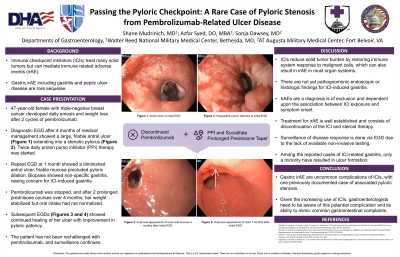Tuesday Poster Session
Category: Stomach
P4219 - Passing the Pyloric Checkpoint: A Rare Case of Pyloric Stenosis from Pembrolizumab Related Ulcer Disease
Tuesday, October 24, 2023
10:30 AM - 4:00 PM PT
Location: Exhibit Hall

Has Audio

Shane M. Mudrinich, MD
Walter Reed National Military Medical Center
Bethesda, MD
Presenting Author(s)
Award: Presidential Poster Award
Shane M. Mudrinich, MD1, Azfar S.. Syed, DO, MBA1, Sonja P. Dawsey, MD2
1Walter Reed National Military Medical Center, Bethesda, MD; 2Fort Belvoir Community Hospital, Fort Belvoir, VA
Introduction: Immune checkpoint inhibitors (ICIs) have advanced treatment of many solid tumors but can also mediate immune related adverse events (irAE). Within the gastrointestinal tract, the liver and colon are most commonly cited. Gastritis is a rare complication of these therapies and can lead to peptic ulcer disease and further sequelae. Here we present the first documented case of ICI therapy resulting in pyloric stenosis.
Case Description/Methods: A 47-year-old female with triple negative breast cancer developed daily emesis of undigested food two cycles into her treatment course with pembrolizumab immunotherapy. She reported significant dyspepsia and unintentional weight loss leading to evaluation with an upper endoscopy (EGD) four months later. EGD identified a large, friable antral ulcer extending into a stenotic pylorus. Biopsies showed mild inflammation without helicobacter pylori. She denied any non-steroidal anti-inflammatory medication use and was started on sucralfate along with twice daily proton pump inhibitor. A repeat EGD at 2 months showed minimal change with biopsies showing non-specific gastritis. However, pathology felt the findings were suggestive of ICI-induced gastritis which prompted cessation of pembrolizumab and initiation of a 4-week prednisone taper. At 2 months, her weight stabilized but oral intake was poor. Another EGD showed continued healing of her ulcer with minimal improvement in pyloric patency; prompting a prolonged prednisone taper. Her symptoms have completely resolved and recent EGD showed resolution of her pyloric stenosis with marked improvement of ulcerations.
Discussion: ICIs reduce solid tumor burden by restoring immune system response to malignant cells. However, this action can also induce irAE in other organ systems. Recent reviews suggest there are not yet pathognomonic endoscopic or histologic findings for ICI-induced gastritis, with only the timing of ICI exposure and exclusion of other causative agents to indicate this etiology. Among the reported cases of ICI-related gastritis, the minority have led to ulcer formation, and there are no reported cases associated with pyloric stenosis. Treatment for irAE is well established and consists of discontinuation of the ICI and initiation of steroid therapy as is described in this case. Surveillance of disease is done via EGD. Given the increasing use of ICIs, gastroenterologists need to be aware of this potential complication and its ability to mimic common gastrointestinal complaints.
Disclosures:
Shane M. Mudrinich, MD1, Azfar S.. Syed, DO, MBA1, Sonja P. Dawsey, MD2. P4219 - Passing the Pyloric Checkpoint: A Rare Case of Pyloric Stenosis from Pembrolizumab Related Ulcer Disease, ACG 2023 Annual Scientific Meeting Abstracts. Vancouver, BC, Canada: American College of Gastroenterology.
Shane M. Mudrinich, MD1, Azfar S.. Syed, DO, MBA1, Sonja P. Dawsey, MD2
1Walter Reed National Military Medical Center, Bethesda, MD; 2Fort Belvoir Community Hospital, Fort Belvoir, VA
Introduction: Immune checkpoint inhibitors (ICIs) have advanced treatment of many solid tumors but can also mediate immune related adverse events (irAE). Within the gastrointestinal tract, the liver and colon are most commonly cited. Gastritis is a rare complication of these therapies and can lead to peptic ulcer disease and further sequelae. Here we present the first documented case of ICI therapy resulting in pyloric stenosis.
Case Description/Methods: A 47-year-old female with triple negative breast cancer developed daily emesis of undigested food two cycles into her treatment course with pembrolizumab immunotherapy. She reported significant dyspepsia and unintentional weight loss leading to evaluation with an upper endoscopy (EGD) four months later. EGD identified a large, friable antral ulcer extending into a stenotic pylorus. Biopsies showed mild inflammation without helicobacter pylori. She denied any non-steroidal anti-inflammatory medication use and was started on sucralfate along with twice daily proton pump inhibitor. A repeat EGD at 2 months showed minimal change with biopsies showing non-specific gastritis. However, pathology felt the findings were suggestive of ICI-induced gastritis which prompted cessation of pembrolizumab and initiation of a 4-week prednisone taper. At 2 months, her weight stabilized but oral intake was poor. Another EGD showed continued healing of her ulcer with minimal improvement in pyloric patency; prompting a prolonged prednisone taper. Her symptoms have completely resolved and recent EGD showed resolution of her pyloric stenosis with marked improvement of ulcerations.
Discussion: ICIs reduce solid tumor burden by restoring immune system response to malignant cells. However, this action can also induce irAE in other organ systems. Recent reviews suggest there are not yet pathognomonic endoscopic or histologic findings for ICI-induced gastritis, with only the timing of ICI exposure and exclusion of other causative agents to indicate this etiology. Among the reported cases of ICI-related gastritis, the minority have led to ulcer formation, and there are no reported cases associated with pyloric stenosis. Treatment for irAE is well established and consists of discontinuation of the ICI and initiation of steroid therapy as is described in this case. Surveillance of disease is done via EGD. Given the increasing use of ICIs, gastroenterologists need to be aware of this potential complication and its ability to mimic common gastrointestinal complaints.
Disclosures:
Shane Mudrinich indicated no relevant financial relationships.
Azfar Syed indicated no relevant financial relationships.
Sonja Dawsey indicated no relevant financial relationships.
Shane M. Mudrinich, MD1, Azfar S.. Syed, DO, MBA1, Sonja P. Dawsey, MD2. P4219 - Passing the Pyloric Checkpoint: A Rare Case of Pyloric Stenosis from Pembrolizumab Related Ulcer Disease, ACG 2023 Annual Scientific Meeting Abstracts. Vancouver, BC, Canada: American College of Gastroenterology.

